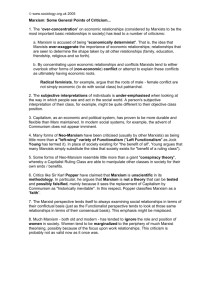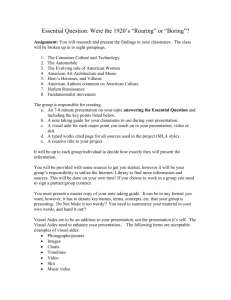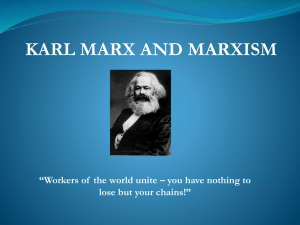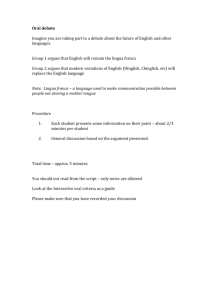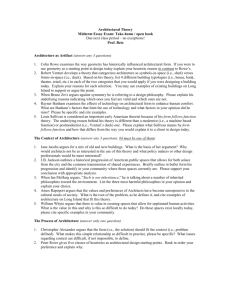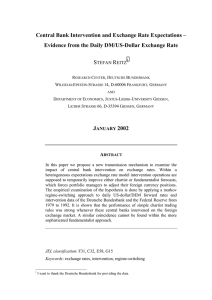0.19Mb
advertisement
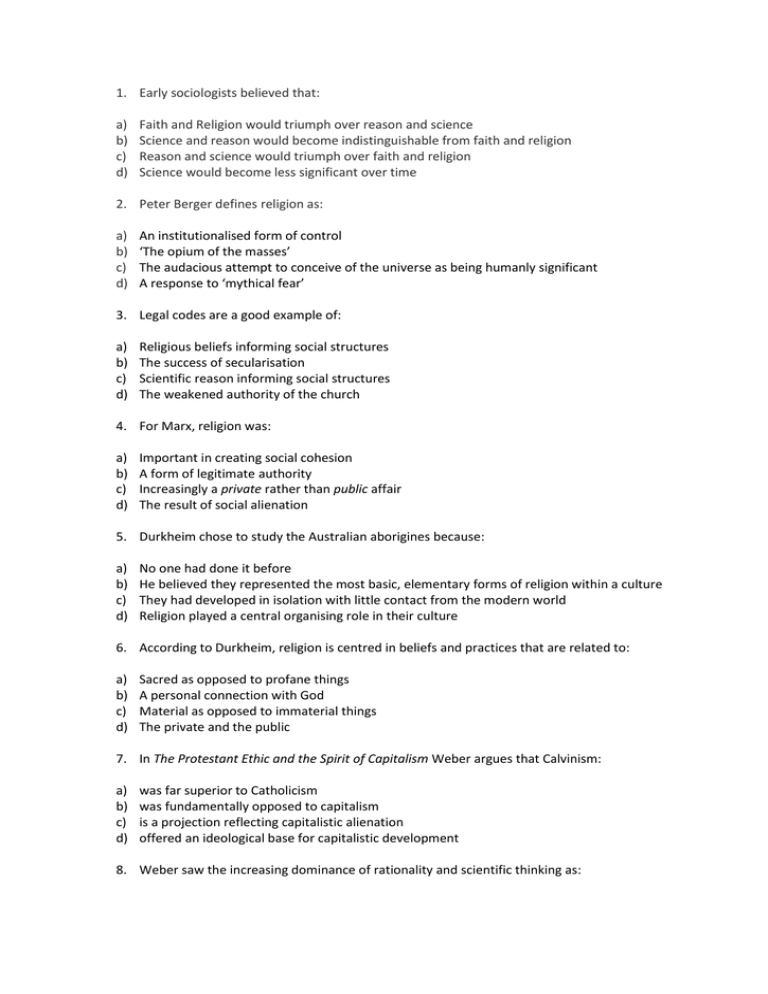
1. Early sociologists believed that: a) b) c) d) Faith and Religion would triumph over reason and science Science and reason would become indistinguishable from faith and religion Reason and science would triumph over faith and religion Science would become less significant over time 2. Peter Berger defines religion as: a) b) c) d) An institutionalised form of control ‘The opium of the masses’ The audacious attempt to conceive of the universe as being humanly significant A response to ‘mythical fear’ 3. Legal codes are a good example of: a) b) c) d) Religious beliefs informing social structures The success of secularisation Scientific reason informing social structures The weakened authority of the church 4. For Marx, religion was: a) b) c) d) Important in creating social cohesion A form of legitimate authority Increasingly a private rather than public affair The result of social alienation 5. Durkheim chose to study the Australian aborigines because: a) b) c) d) No one had done it before He believed they represented the most basic, elementary forms of religion within a culture They had developed in isolation with little contact from the modern world Religion played a central organising role in their culture 6. According to Durkheim, religion is centred in beliefs and practices that are related to: a) b) c) d) Sacred as opposed to profane things A personal connection with God Material as opposed to immaterial things The private and the public 7. In The Protestant Ethic and the Spirit of Capitalism Weber argues that Calvinism: a) b) c) d) was far superior to Catholicism was fundamentally opposed to capitalism is a projection reflecting capitalistic alienation offered an ideological base for capitalistic development 8. Weber saw the increasing dominance of rationality and scientific thinking as: a) b) c) d) the end of the ‘theological stage’ of human development a product of feudalism creating greater individual freedom creating a ‘disenchanted’ world 9. The ‘secularisation’ thesis makes the claim that: a) b) c) d) humans will ‘outgrow’ belief in the supernatural we must proceed bureaucratically there will be a revival of religious fundamentalism we are witnessing the end of ideology 10. Rodney Stark claims that religious decline is: a) b) c) d) a myth an aspect of modernity inevitable only evident in eastern Europe 11. Steve Bruce argues that New Age spiritualities are seen as: a) b) c) d) exploiting their followers evidence of the declining significance of religion a matter of choice rather than authority developing from new media 12. The claim that ‘god is dead’, is meant by Friedrich Nietzsche to be: a) b) c) d) an ontological argument a social fact a subjective position an absurdity 13. Jonathan Sacks argues that in the modern world: a) b) c) d) religion has lost all authority the limitations of science are obvious religion is responsible for many conflicts religion is increasingly a private rather than public affair 14. Stephen Seidman sees the transformation of European society in the rise of modernity as: a) b) c) d) bringing forth problems of meaning creating vast material wealth helping to end the despotism of the church reducing human interactions to a logic of market exchange 15. Which of the following are examples of science projecting itself ‘as a secular ideological replacement for religion?’ a) Post-modernism, Marxism and social evolutionism b) Marxism, Comtean positivism and social evolutionism c) Fundamentalism, post-modernism and post-structuralism d) Marxism, post-postmodernism and post-structuralism 16. Fundamentalist religious groups speak with the ‘rarest of modern accents- ___?’ a) b) c) d) Scepticism Naivety Compassion Authority 17. The Fundamentalist Project’s categories of fundamentalist groups are: a) b) c) d) Christian, Jewish and Muslim World Conqueror, World Transformer and World Ruler Christian, Islamic and Environmentalist World Conqueror, World Transformer and World Renouncer 18. Which of the following is NOT an example of a ‘World Conqueror’ movement? a) b) c) d) Hamas Revolutionary Shi’ism Fundamentalist Protestantism Haredi Jews 19. Sacks argues that many religious believers experience the modern condition as: a) b) c) d) An assault to be resisted Core to their beliefs Bringing us better social values Reinforcing religion 20. Who claims that understanding religion is necessary to form a coherent picture of reality? a) b) c) d) Jurgen Habermas Ninian Smart Ross McCormack Tracey McIntosh
